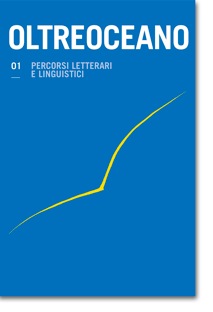La proiezione dell’italianità nel romanzo Olivo Oliva di Philippe Antonio Poloni
Keywords:
italianità, migrazione, autobiografiaAbstract
Poloni, e come lui molti scrittori di seconda e terza generazione, insistendo sull’opposizione tra realtà e invenzione, elabora una visione composita e fittizia dell’italianità che, svuotata di qualsiasi valenza patriottica o passatista, è piuttosto un mosaico o una proiezione letteraria. Accanto alle esperienze autobiografiche, si ritrovano in essa gli influssi artistici di autori famosi e, insieme, i pregiudizi e i luoghi comuni elaborati all’estero sull’Italia
The Projection of Italianness in Philippe Antonio Poloni’s novel Olivo Oliva
Like many second- and third-generation writers, Poloni relies on the opposition between reality and invention to create a composite and fictional vision of Italianness. Void of any patriotic or traditionalist meaning, this Italianness is rather a mosaic or literary projection which combines both autobiographical experiences and the artistic influences of famous authors, as well as the prejudices and stereotypes about Italy that were created abroad.
Downloads
References
Bernier, S. (2002): Les Héritiers d’Ulysse. Outremont (Québec): Lanctôt.
Camilleri, A (2001, 23 gennaio): Internetvista trascritta da Paola Rossi. Recuperato da http://www.angelfire. com/pa/camilleri/internetvista.html
Calvino, I. (1989): Il barone rampante. Milano: Garzanti.
Fortin, M.-C. (2002.09.26): Le chef d’oeuvre inconnu. Voir.
Fratta, C. & Nardout-Lafarge, É. (Eds.) (2003): Italies imaginaires du Québec. Montréal: Fides.
Lotman, Jurij Michailovic (1996): La struttura del testo poetico, 1970. E. Bazzarelli, Trad. it. di E. Klein & G. Schiaffino. Milano: Mursia.
Martel, R. (1997.03.16): Un autre petit livre parfait. La Presse.
Montepetit, C. (2002, 21-22 septembre): Philippe Poloni – Le Waterloo du peintre. Le Devoir, s.p.
Mayer, A. (2000.01.20): Two Well-Oiled Tales. Eye Weekly.
Melissa, P. [pseudonimo di Melissa Pananello] (2007): L’odeur de ton souffle, 2005. Trad. di P. A. Poloni. Montréal: Lanctôt.
Papa, E. (1991): La Sicilia nella testa. Siracusa: Ariete.
Pirandello, L. (2000): Sei personaggi in cerca d’autore; Enrico IV. Milano: Arnoldo Mondadori.
Poloni, P. A. (1997): Olivo Oliva. Outremont (Québec): Lanctôt.
Poloni, P. A. (1998): Le cordonnier qui enseigne. Stop, p. 155.
Poloni, P. A. (2002): Des truites à la tomate. Montréal: Québec Amérique.
Poloni, P. A. (2004, 23 juin): E-mail autografa a Lucia Toffoli.
Poloni, P.A. (2004, 24 août): Lettera autografa a Lucia Toffoli. Montréal.
Sartor, M. (Ed.), (2005): Realismo Magico. Fantastico e iperrealismo nell’arte e nella letteratura latinoamericane. Atti del Convegno Internazionale di Studi di Udine 23-25 settembre 2004. Udine: Forum.
Scerri, M. (1994): Camilleri e la sicilianità letteraria. Recuperato da http://vigata.org/tesi/tesi1.shtml
Sweet L. (2004): Writings with a Sicilian Accent. V. Fazio & D. De Santis (Eds.). New York, Ottawa: Legas.
Downloads
Published
How to Cite
Issue
Section
License

This work is licensed under a Creative Commons Attribution-NonCommercial-ShareAlike 4.0 International License.
The authors undertake to comply with the following conditions, which are considered accepted at the time of submission of their contributions.
The sending of a text implies that it is unpublished and not submitted to be published elsewhere.
1. If accepted, the author shall confer on the publisher the right to publish and distribute it both in paper form and in the online electronic edition. The published articles will be downloadable and made available in open access.
2. Provided that it correctly indicates that the first publication took place in the journal Oltreoceano. Rivista sulle migrazioni the author has the right to: a) reproduce the article in separate extracts or collected in a volume; b) publish the article on their personal website or teaching site provided that these sites are of a non-commercial nature; c) deposit the article in online archives of a non-commercial nature, linked to the institution they belong to or as part of projects for the non-commercial dissemination and open access of scientific works.
The use of contributions by third parties, for commercial or otherwise unauthorized purposes, is not allowed. The publisher declines all responsibility for the unauthorized use of the material published in the journal.












